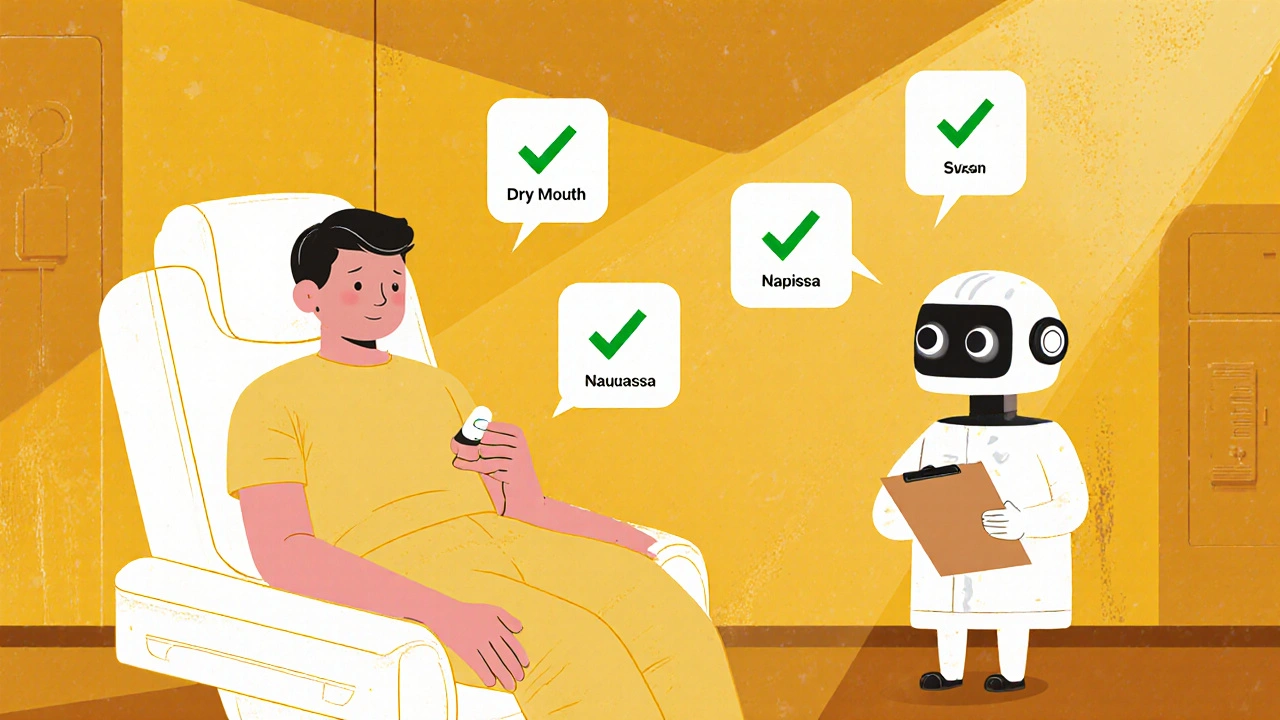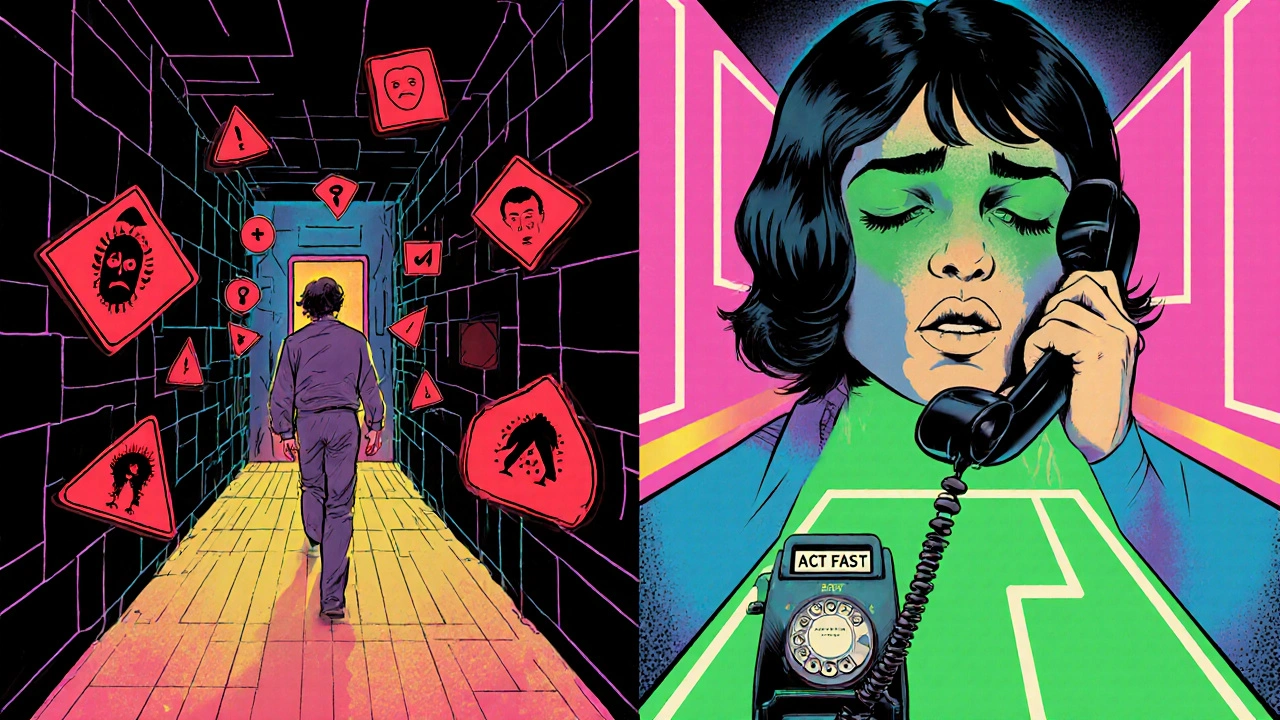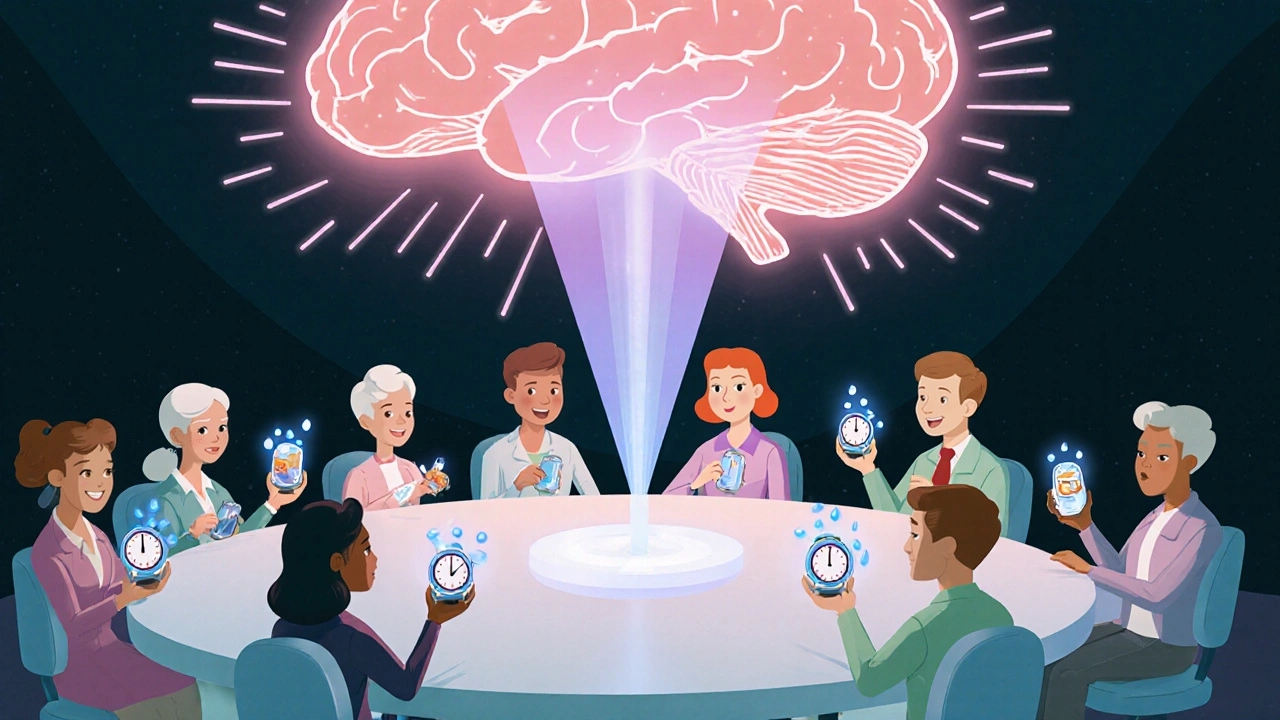When to Accept vs Address Medication Side Effects: Making Smart Choices
 Nov, 1 2025
Nov, 1 2025
Side Effect Assessment Tool
Describe Your Side Effect
Enter your symptom below. The tool will assess if it's mild, manageable, or requires immediate medical attention.
Side effects from medication aren’t always a reason to panic - but they’re also not something you should ignore. The real challenge? Knowing when to push through a minor discomfort and when to call your doctor. Too many people either quit their meds altogether or suffer in silence, thinking it’s just part of the deal. But it doesn’t have to be that way. The difference between a manageable side effect and a dangerous one isn’t always obvious - and getting it wrong can cost you your health.
Not All Side Effects Are Created Equal
Side effects are common. In fact, the Food and Drug Administration (FDA) defines them as unintended responses to medications at normal doses. That means if you’re taking a drug for depression, high blood pressure, or arthritis, your body is likely reacting to it in some way. But not all reactions are equal.Some side effects are mild and temporary. Dry mouth from antidepressants? Happens in 60% of people on antipsychotics. Initial drowsiness after starting a new mood stabilizer? Often fades within 7 to 10 days. These aren’t signs the drug is failing - they’re signs your body is adjusting. The American Medical Association says these kinds of side effects are often acceptable if they don’t interfere with your daily life and the medication is working well for your condition.
But then there are side effects that demand action. Dizziness that makes you stumble. Confusion that makes you forget your own name. Black stools or vomiting blood. These aren’t just uncomfortable - they’re red flags. The CDC reports over 1.5 million emergency visits each year in the U.S. due to adverse drug events, many of which could’ve been avoided with earlier intervention. If a side effect is getting worse, lasting longer than two weeks, or blocking you from doing basic things like walking, driving, or sleeping - it’s time to talk to your provider.
When It’s Safe to Tolerate
There are situations where accepting a side effect makes sense. Think of it like training for a marathon: you expect sore muscles, but you don’t stop running because your legs hurt. Similarly, if you’re on medication for a serious condition - like treatment-resistant depression or epilepsy - some discomfort may be worth enduring.Take mirtazapine, an antidepressant. Around 15-20% of users gain weight. For someone whose depression has kept them bedridden for months, a 5-pound gain might feel like a small price to pay for feeling like themselves again. The beMedWise program advises patients to weigh the benefit against the bother: if the medication is doing what it’s supposed to, and the side effect is mild, patience can pay off.
Other mild side effects can often be managed without changing your dose:
- Dry mouth? Sip water. Chew sugar-free gum. Keep a bottle by your bed.
- Stomach upset? Take your pill with food. For metformin, this cuts nausea by 60-70%.
- Drowsiness? Move your dose to bedtime. The FDA says 30-40% of patients who switch timing see big improvements.
- Mild headaches? Try a short walk, hydration, or a nap. These often resolve in a few days.
These aren’t tricks - they’re evidence-backed strategies. But here’s the catch: only 35% of patients use them without guidance. That’s why it’s smart to ask your pharmacist or doctor: “What can I do at home to make this easier?”
When You Must Act - And Fast
Some side effects aren’t just annoying - they’re dangerous. And waiting too long can turn a fixable problem into a life-threatening one.Here’s what you should never ignore:
- Swelling in your face, lips, or throat - this could be an allergic reaction. Call 999 or go to A&E immediately.
- Hives, rash, or peeling skin - especially with drugs like allopurinol. The FDA has a black box warning for this: stop the drug and get help right away.
- Black, tarry stools or vomiting blood - signs of internal bleeding. This happens in 0.5-1% of NSAID users annually, but it’s serious enough that every case needs urgent evaluation.
- Sudden confusion, memory loss, or trouble walking - especially if you’re over 65 or taking multiple meds. The National Institute on Aging calls this a red flag for drug interactions.
- Severe chest pain, rapid heartbeat, or trouble breathing - these can signal heart-related side effects from certain blood pressure or psychiatric drugs.
If any of these happen, don’t wait. Don’t Google it. Don’t hope it goes away. Call your doctor or go to the nearest emergency department. Delaying care can lead to permanent damage.

How to Talk to Your Doctor - the Right Way
A lot of side effects get worse because patients don’t know how to communicate them. Saying “I feel weird” doesn’t help. Saying “I’ve had nausea every morning since Tuesday, it’s a 7/10, and I skipped breakfast because I couldn’t eat” - that’s useful.The FDA recommends tracking side effects with three key details before your appointment:
- Severity - rate it from 1 to 10. Is it a 2 (barely noticeable) or a 9 (can’t get out of bed)?
- Timing - when does it happen? Right after taking the pill? 2 hours later? Only at night?
- Impact - does it stop you from working, driving, sleeping, or spending time with family?
Dr. Michael Chen at Johns Hopkins found that patients who track side effects this way are 4.2 times more likely to get the right fix - whether that’s a lower dose, a different time to take it, or a switch to another drug.
Prepare these three questions before your visit:
- “Is this side effect expected with this medication?”
- “How long should I expect it to last?”
- “What should I do if it gets worse?”
A 2023 study in JAMA Internal Medicine showed patients who asked these questions resolved their side effects 32% faster than those who didn’t.
Why People Get It Wrong - And How to Avoid It
Most people don’t stop taking meds because they’re noncompliant. They stop because they’re scared, confused, or feel like they’re being told to just “tough it out.”An analysis of 782 Reddit threads from early 2023 to mid-2024 found that 65% of users tried to handle side effects alone first. Of those, 42% ended up suffering longer than necessary. The biggest mistake? Quitting cold turkey.
The CDC says 28% of patients stop their meds entirely because of side effects - and 73% of those cases led to treatment failure. That means your depression came back. Your blood pressure spiked. Your seizures returned. All because you didn’t ask for help.
On the flip side, success stories are everywhere. One 62-year-old patient in the UK was struggling with nausea from antibiotics. She took them on an empty stomach. Her pharmacist suggested pairing them with a small high-protein snack - like a boiled egg or a spoonful of peanut butter. Nausea dropped from 5-6 times a day to just 1-2. No dose change. No new drug. Just a simple adjustment.

It’s Not One-Size-Fits-All
Your tolerance for side effects depends on your condition. If you’re on chemotherapy, nausea and fatigue are expected - and often accepted - because the alternative is worse. But if you’re taking a pill for mild high blood pressure, even a small headache or dry mouth might be enough to justify switching to a different drug.The American Heart Association says for essential hypertension, if side effects interfere with more than 20% of your daily activities or last longer than four weeks, it’s time to consider alternatives.
Cost also plays a role. A 2023 Kaiser Family Foundation study found that 37% of people keep taking meds with bothersome side effects because they can’t afford to switch - even though cheaper alternatives may exist. Talk to your doctor about generics or patient assistance programs. You don’t have to suffer because of price.
What Works - And What Doesn’t
Here’s what the data shows about fixing side effects:| Strategy | Success Rate | Best For |
|---|---|---|
| Dose adjustment | 45-50% | Mild to moderate side effects |
| Changing timing (e.g., bedtime) | 30-35% | Drowsiness, nausea |
| Switching to another drug in same class | 15-20% | When side effects are persistent or severe |
| Adding a second medication (e.g., anti-nausea pill) | 10-15% | Severe but manageable side effects |
| Stopping medication | Only if no other option - high risk of relapse | Not recommended without provider input |
The bottom line? You have options. You don’t have to choose between suffering and quitting. But you need to speak up.
Final Takeaway
Medication side effects aren’t a sign you’re doing something wrong. They’re a signal - sometimes quiet, sometimes loud - that your body is responding. The key is learning how to listen.Accept the small stuff. Manage it with simple, proven tricks. But don’t be afraid to demand help when it’s serious. Your health isn’t a test of endurance. It’s a partnership - and your voice matters just as much as your doctor’s.
Should I stop my medication if I have side effects?
No - unless it’s a life-threatening reaction like swelling, trouble breathing, or a severe rash. Stopping medication without talking to your doctor can cause your original condition to return or worsen. For most side effects, there are safer options like adjusting the dose, changing the time you take it, or switching to a different drug. Always consult your provider first.
How long should I wait before calling my doctor about a side effect?
If a side effect is mild and expected (like slight drowsiness or dry mouth), give it 7-10 days to see if it improves. But if it’s getting worse, lasts longer than two weeks, or affects your ability to function - call your doctor right away. Don’t wait for it to become unbearable. Early intervention means faster solutions.
Can I manage side effects on my own without medication changes?
Yes - for many mild side effects. Drinking more water helps with dry mouth. Taking pills with food reduces stomach upset. Moving your dose to bedtime can fix drowsiness. Chewing sugar-free gum, using a humidifier, or avoiding caffeine can also help. But don’t guess - ask your pharmacist what’s safe and effective for your specific medication.
Why do some people have side effects and others don’t?
Everyone’s body reacts differently. Genetics, age, liver and kidney function, other medications, diet, and even gut bacteria can affect how you process drugs. Older adults and people taking multiple medications are more likely to experience side effects. That’s why personalized care matters - what works for your friend might not work for you.
Are generic drugs more likely to cause side effects than brand-name ones?
No. Generic drugs contain the same active ingredient as brand-name versions and are required by law to work the same way. Side effects are usually identical. If you notice new side effects after switching to a generic, it might be due to different inactive ingredients (like fillers or dyes), but this is rare. Talk to your pharmacist if you suspect a reaction to a change in formulation.
What if my doctor says the side effect is normal but I still feel awful?
Your experience matters. Just because a side effect is common doesn’t mean it’s acceptable - especially if it’s affecting your quality of life. Ask: “Is there another option that might be easier to tolerate?” or “Can we try a lower dose?” If your doctor dismisses your concerns, seek a second opinion. You deserve care that respects how you feel.

Emily Barfield
November 2, 2025 AT 12:44So let me get this right: we’re supposed to tolerate drowsiness, dry mouth, weight gain… but if I start seeing black stools, I’m supposed to sprint to the ER? What a bizarre, Kafkaesque system we’ve built-where your body screams for help, but the medical establishment treats discomfort like a minor inconvenience you should just… endure? I mean, if my car made a noise like that, I’d take it to the mechanic. Why do we treat our own biology like a disposable appliance? And why is the solution always ‘wait and see’-as if time is a cure, not a countdown?
Jessica Adelle
November 3, 2025 AT 15:23It is imperative to emphasize that the reckless abandonment of prescribed pharmaceutical regimens constitutes a grave dereliction of personal responsibility. The FDA, CDC, and AMA have issued unequivocal guidelines regarding the management of adverse drug reactions-guidelines which, if followed with due diligence, obviate the need for panic or self-diagnosis. To suggest that patients should second-guess evidence-based protocols is not only irresponsible-it is dangerously naive. Compliance is not oppression; it is the bedrock of modern therapeutics.
Sai Ahmed
November 5, 2025 AT 00:12Everyone’s talking about side effects like they’re random. But have you ever wondered who profits from this? Big Pharma makes more money when you keep taking the same drug with side effects than when you switch. They don’t want you to know about the cheaper alternatives. They want you dependent. And that’s why your doctor never mentions generics-because they get kickbacks from the brand-name makers. You think this is medicine? It’s a racket.
Albert Schueller
November 6, 2025 AT 12:05Idk why people think they can just 'manage' side effects w/ gum or water. Like, i took metformin and got diarrhea for 3 weeks. I tried eating bread. I tried timing it. I tried everything. Then i stopped. And guess what? My sugar went nuts. So yeah, maybe the system is broken. But maybe the real problem is that doctors don't listen. I've had 3 drs tell me 'it's normal' when i was puking. Normal? No. It's negligence.
Ted Carr
November 8, 2025 AT 04:10So let me summarize: if you’re rich enough to afford a pharmacist consultation and have the emotional bandwidth to track side effects on a 1–10 scale, you’ll be fine. If you’re poor, tired, or working three jobs? Good luck. This isn’t healthcare. It’s a luxury subscription service with a side of guilt.
Rebecca Parkos
November 8, 2025 AT 20:22I was on sertraline for six months and gained 18 pounds. I cried every night because I felt like a monster in the mirror. I almost quit-until my therapist said, 'What if you focus on how much calmer you are?' I didn’t stop. I didn’t give up. I added walking, I talked to my doctor, we adjusted the dose. Now I’m stable. I’m not 'tolerating' anymore-I’m thriving. If you’re suffering, you’re not weak. You’re just not being heard. Speak up. Even if your voice shakes.
Bradley Mulliner
November 10, 2025 AT 17:36Let’s be brutally honest: most people who complain about side effects are just lazy. They want a magic pill that fixes everything without any cost. Dry mouth? Drink water. Drowsiness? Sleep more. Weight gain? Exercise. If you can’t handle the side effects of a medication that’s literally saving your life, maybe you shouldn’t be on it. This isn’t a spa-it’s medicine. Toughen up.
Rahul hossain
November 11, 2025 AT 23:55One cannot help but observe the exquisite irony of a system that exhorts patients to 'listen to their bodies' while simultaneously dismissing their lived experiences as 'non-compliance.' The pharmaceutical-industrial complex has weaponized the language of empowerment-'you have options!'-while ensuring those options remain buried under insurance barriers, copays, and physician inertia. In India, we call this 'bureaucratic cruelty dressed in white coats.' The truth? The body remembers. And so does the soul. When your doctor says 'it's normal,' ask: 'Normal for whom?'